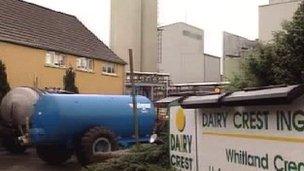Dairy Crest closure plan in Whitland puts 31 jobs at risk
- Published

The Whitland creamery was first closed in 1994 but a dairy reopened
A dairy in Carmarthenshire could close with the loss of 31 jobs, only nine months after being taken over.
Proper Welsh Milk in Whitland was taken over by Dairy Crest in March this year.
Dairy Crest said that due to lower sales and higher costs it is now impossible to operate the site economically.
The Farmers' Union of Wales (FUW) described the proposed closure as a "major blow" to the region's capacity to process milk locally.
Dairy Crest closed a creamery at the site in 1994 whilst Proper Welsh invested £1.5m there in 2011.
A consultation period has started with workers over the proposed closure.
Dairy Crest had bought the business from administrators.
Mark Allen, the chief executive of Dairy Crest said: "We are disappointed that it has not been possible to make a success of Proper Welsh."
He said the company would do all it can to help employees at the dairy.
"We will also work with customers to offer them alternative packing arrangements and ensure there is no disruption to their services.
"We remain committed to the Welsh dairy sector and are continuing to recruit farmers and invest in milk collection facilities around Carmarthen," Mr Allen added.
Proper Welsh invested £1.5m at the site in 2011. At the time it said it would create 14 jobs, increasing to more than 40 later.
Before that a Dairy Crest creamery at the Whitland site closed in 1994 with 150 job losses.
The FUW described the proposal to close the dairy at Whitland as a "major body blow for the region's capacity to process milk locally".
Vice president Brian Walters, who runs a dairy farm near Carmarthen, said: "There is already a lack of processing capacity for milk in Wales and this move, so soon after Dairy Crest took over the dairy, comes at a time when there are increasing calls for more local processing.
"As a local dairy farmer I think it is a great pity because we need more processing capacity in Wales, not less, to help cut down on food miles and prepare ourselves for the abolition of Milk Quota in 2015.
"If we are hoping to produce more milk in the future to meet an expanding market, we need to be able to access more processing capacity locally, not further away."
- Published27 October 2011
- Published8 July 2011